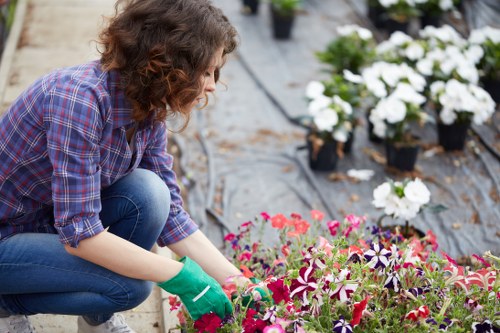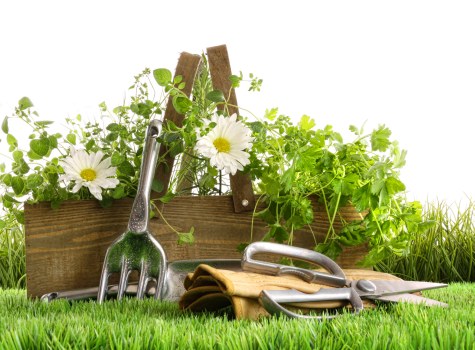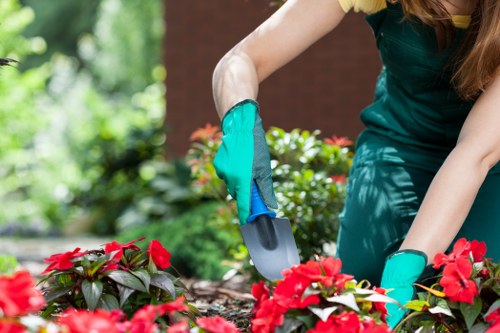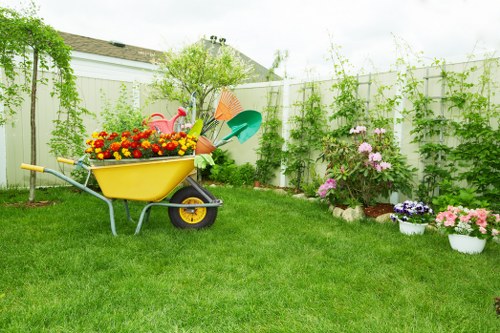Garden Maintenance in Hornsey

Maintaining a beautiful garden in Hornsey requires a mix of dedication, knowledge, and the right tools. Whether you're a seasoned gardener or just starting out, understanding the unique climate and soil conditions of Hornsey can make all the difference in achieving a lush and vibrant outdoor space.
Hornsey boasts a temperate climate, which is ideal for a wide variety of plants. However, this also means gardeners must be vigilant against common pests and diseases that thrive in such environments. Regular maintenance not only enhances the aesthetic appeal of your garden but also ensures the health and longevity of your plants.
One of the first steps in effective garden maintenance is proper planning. This includes selecting the right plants, scheduling appropriate care routines, and investing in the necessary tools and equipment. By taking a proactive approach, you can prevent many common gardening issues and enjoy a thriving garden all year round.

Importance of Garden Maintenance
Regular garden maintenance is crucial for several reasons. It helps in promoting healthy plant growth, preventing the spread of diseases, and ensuring the overall beauty of your outdoor space. A well-maintained garden can also increase the value of your property and provide a relaxing environment for you and your family.
Moreover, garden maintenance plays a significant role in environmental sustainability. By taking care of your garden, you contribute to the local ecosystem, supporting pollinators like bees and butterflies, and promoting biodiversity. This not only benefits your garden but also the broader community and environment.
Neglecting garden maintenance can lead to overgrown plants, increased pest infestations, and a decline in plant health. This can make your garden an uninviting space and require more extensive work to restore its former glory. Therefore, regular upkeep is essential for maintaining a vibrant and healthy garden.

Seasonal Garden Care in Hornsey
Spring
Spring is a critical time for garden maintenance in Hornsey. As the weather warms up, it's the perfect opportunity to prepare your garden for the growing season. Start by clearing away any debris that has accumulated over the winter months. This includes fallen leaves, dead branches, and any other organic matter that can hinder the growth of your plants.
Planting new flowers and vegetables in the spring ensures a vibrant and productive garden throughout the year. It's also essential to fertilize your soil to provide the necessary nutrients for plant growth. Additionally, spring is an ideal time for pruning and shaping your plants to encourage healthy development.
Finally, be on the lookout for early signs of pests and diseases. Addressing these issues promptly can prevent widespread infestations and protect the overall health of your garden.

Summer
Summer in Hornsey brings longer days and plenty of sunshine, making it an excellent time for gardening activities. Regular watering is crucial during the summer months to keep your plants healthy and hydrated. Consider installing a drip irrigation system to ensure consistent moisture levels without overwatering.
Weeding becomes more challenging in the summer as weeds grow rapidly. Regular weeding not only improves the appearance of your garden but also prevents competition for nutrients between weeds and your desired plants. Mulching can be an effective strategy to suppress weed growth and retain soil moisture.
Additionally, summer is the time to enjoy the fruits of your labor by harvesting ripe vegetables and enjoying the blooms of your summer flowers. Proper harvesting techniques can encourage continued production and extend the blooming period of your plants.

Autumn
Autumn is a transitional period in Hornsey gardens, signaling the end of the growing season. It's an ideal time for planting spring bulbs, which will bloom beautifully in the following spring. Clean up fallen leaves and debris to prevent the buildup of pests and diseases over the winter.
Pruning is another essential autumn activity. Focus on removing dead or diseased branches and shaping your plants to promote healthy growth in the spring. This is also a good time to plant new trees and shrubs, allowing them to establish their root systems before the winter months.
Finally, prepare your garden beds for the colder months by adding compost or mulch. This helps insulate the soil, protecting plant roots from freezing temperatures and preparing them for the next growing season.

Winter
Winter may be a quieter time for garden maintenance, but it's still essential to care for your garden during the colder months. Protect tender plants by covering them with burlap or other protective materials to shield them from frost and harsh winds.
Use this time to plan and design your garden for the upcoming year. Consider what worked well and what didn't, and make adjustments to improve your garden's layout and plant selection. This proactive planning can lead to a more successful and enjoyable gardening experience.
Additionally, maintain your gardening tools by cleaning and sharpening them, ensuring they're ready for use when the growing season resumes. Properly maintained tools not only last longer but also make garden tasks easier and more efficient.

Selecting the Right Plants for Hornsey Gardens
Choosing the right plants is fundamental to successful garden maintenance. Hornsey's climate supports a wide range of plant species, but selecting those best suited to the local conditions will ensure your garden thrives.
Consider factors such as sunlight, soil type, and water availability when selecting plants. Native plants are often a good choice as they're adapted to the local environment and require less maintenance. They also support local wildlife, including pollinators and beneficial insects.
Incorporate a mix of perennials and annuals to ensure your garden has continuous blooms throughout the year. Perennials provide lasting beauty and require less frequent replanting, while annuals offer vibrant colors and variety each season.

Flowering Plants
Flowering plants add color and life to your garden. Popular options in Hornsey include roses, lavender, and peonies. These plants not only enhance the visual appeal but also attract pollinators, which are essential for a healthy garden ecosystem.
When selecting flowering plants, consider their blooming seasons to ensure a continuous display of color. Grouping plants with similar water and sunlight requirements can also make maintenance easier.
Regular deadheading, the removal of spent flowers, encourages further blooming and keeps plants looking tidy.

Vegetable and Herb Gardens
Vegetable and herb gardens are rewarding additions to any Hornsey garden. They provide fresh produce and add variety to your garden space. Choose varieties that are well-suited to Hornsey's climate and ensure they receive adequate sunlight and water.
Implement crop rotation practices to prevent soil depletion and reduce the risk of pest infestations. Companion planting, where certain plants are grown together for mutual benefit, can also enhance growth and deter pests.
Regular harvesting of vegetables and herbs promotes continued growth and productivity, ensuring a bountiful harvest throughout the growing season.

Lawn Care Tips
A well-maintained lawn is a cornerstone of a beautiful garden. In Hornsey, maintaining a healthy lawn involves regular mowing, watering, and fertilizing. Mow your lawn to the appropriate height, typically around 2-3 inches, to encourage strong root growth and prevent weed establishment.
Water your lawn deeply but infrequently to promote deep root systems. Early morning watering is ideal, reducing evaporation and allowing the grass to dry before evening, which helps prevent fungal diseases.
Fertilize your lawn according to the specific needs of your grass type. Applying the right fertilizer at the right time can enhance growth, color, and resilience against pests and diseases.

Weed Control
Weeds compete with your grass for nutrients, water, and sunlight, detracting from the overall health and appearance of your lawn. Implementing effective weed control strategies is essential for maintaining a pristine lawn.
Regular mowing at the correct height can help suppress weed growth. Additionally, manually removing weeds or using appropriate herbicides can keep them in check. Consider applying a pre-emergent herbicide in the spring to prevent weed seeds from germinating.
Maintaining healthy lawn practices, such as proper fertilization and watering, creates a strong turf that naturally resists weed invasion.

Aeration and Dethatching
Aerating your lawn involves perforating the soil to allow air, water, and nutrients to penetrate the grassroots. This process helps alleviate soil compaction, enhancing root growth and overall lawn health.
Dethatching removes the layer of dead grass, roots, and debris that can build up between the soil and the grass blades. Excess thatch can prevent water and nutrients from reaching the soil, leading to weak and unhealthy grass.
Both aeration and dethatching should be performed during the growing season when the grass can recover quickly. These maintenance tasks are crucial for promoting a thick, resilient lawn.

Pruning and Trimming Techniques
Pruning and trimming are essential practices for maintaining the shape and health of your garden plants. Proper pruning encourages growth, improves air circulation, and removes dead or diseased branches, enhancing the overall appearance of your garden.
Different plants require different pruning techniques. For example, flowering shrubs may need pruning after blooming, while fruit trees benefit from annual shaping to improve fruit production. Understanding the specific needs of each plant ensures effective maintenance and optimal growth.
Regular trimming of hedges and shrubs maintains their desired shape and size, preventing them from becoming overgrown and unruly. Investing in quality pruning tools can make these tasks easier and more efficient.

Tools for Pruning
Having the right tools is crucial for effective pruning and trimming. Essential tools include sharp pruners, loppers, and pruning saws. Sharp tools make clean cuts, reducing the risk of damaging plants and preventing the spread of diseases.
Regularly maintain your pruning tools by cleaning and sharpening them. This not only prolongs their lifespan but also ensures they perform optimally during use.
Safety should always be a priority when pruning. Wear appropriate protective gear and ensure your tools are in good working condition to prevent accidents and injuries.

Pest and Weed Control
Effective pest and weed control are vital components of garden maintenance. Pests can cause significant damage to plants, while weeds compete for essential resources, hindering plant growth.
Implementing integrated pest management (IPM) strategies helps control pest populations while minimizing environmental impact. This includes using natural predators, introducing pest-resistant plant varieties, and applying organic or chemical treatments when necessary.
Weed control involves a combination of manual removal, mulching, and the use of herbicides. Regular monitoring and swift action can prevent weeds from becoming established and spreading throughout your garden.

Natural Pest Control Methods
Natural pest control methods are environmentally friendly ways to protect your garden without relying on harmful chemicals. Introducing beneficial insects, such as ladybugs and praying mantises, can help keep pest populations in check.
Companion planting is another effective strategy, where certain plants are grown together to repel pests. For example, planting marigolds alongside vegetables can deter nematodes and other harmful insects.
Additionally, maintaining healthy plants through proper care practices makes them more resilient against pests and reduces the likelihood of infestations.

Sustainable Gardening Practices
Sustainable gardening practices not only benefit your garden but also contribute to environmental conservation. By adopting eco-friendly methods, you can create a thriving garden that supports local wildlife and reduces your ecological footprint.
Implementing water-saving techniques, such as rainwater harvesting and drip irrigation, ensures efficient use of water resources. Selecting native plants that are adapted to Hornsey's climate reduces the need for excessive watering and maintenance.
Using organic fertilizers and compost enriches the soil naturally, promoting healthy plant growth without the use of synthetic chemicals. Additionally, recycling garden waste through composting minimizes landfill contributions and provides valuable nutrients for your garden.

Composting
Composting is an effective way to recycle organic waste from your garden and kitchen. By creating a compost pile or using a compost bin, you can transform kitchen scraps, leaves, and other organic materials into nutrient-rich compost.
Applying compost to your garden improves soil structure, enhances moisture retention, and provides essential nutrients for plant growth. This natural fertilizer reduces the need for chemical alternatives and supports a healthy, sustainable garden ecosystem.
Regularly turning your compost ensures proper decomposition and prevents unpleasant odors. A well-maintained compost pile can produce high-quality compost that benefits your entire garden.

Hiring Professional Garden Maintenance Services in Hornsey
While many garden maintenance tasks can be handled by homeowners, there are times when hiring professional services is beneficial. Professional gardeners in Hornsey bring expertise, experience, and specialized tools to ensure your garden remains in optimal condition.
Some of the services offered by professional garden maintenance providers include regular lawn care, pruning, pest control, and seasonal planting. They can also assist with more complex tasks such as landscape design, irrigation system installation, and soil testing.
Hiring professionals can save you time and effort, allowing you to enjoy your garden without the stress of constant upkeep. Additionally, their expertise ensures that your garden receives the best care possible, enhancing its beauty and sustainability.

Choosing the Right Service Provider
Selecting the right garden maintenance service in Hornsey involves researching and evaluating potential providers based on their experience, reputation, and range of services offered. Look for companies with positive reviews and a portfolio of completed projects that demonstrate their capabilities.
Discuss your specific garden needs and preferences with the service provider to ensure they can tailor their services to meet your expectations. Transparent pricing and clear communication are also essential factors in establishing a successful working relationship.
Additionally, consider the provider's commitment to sustainable practices and environmentally friendly solutions, especially if you prioritize eco-conscious gardening.

Conclusion
Effective garden maintenance in Hornsey involves a combination of regular care, informed planning, and sometimes the assistance of professionals. By understanding the unique aspects of your local environment and implementing sustainable practices, you can cultivate a beautiful and thriving garden that enhances your property's value and provides a serene outdoor space for enjoyment.
Whether you're tending to a small backyard or a sprawling garden, the principles of proper maintenance remain the same. Consistency, attention to detail, and a willingness to learn will ensure your garden remains a source of pride and relaxation for years to come.
Contact us today to learn more about our professional garden maintenance services in Hornsey and take the first step toward creating your dream garden.

